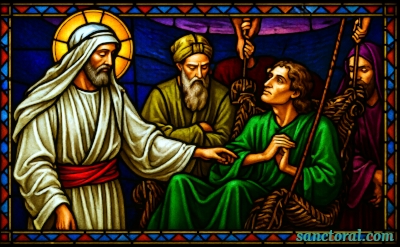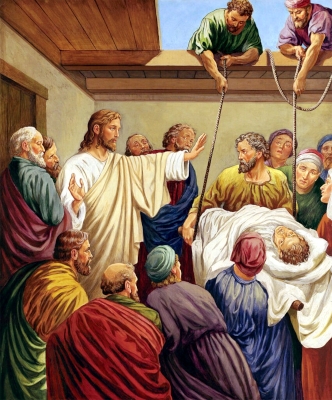The breviary lessons for the “Sunday after Ember Saturday” (Fourth Sunday of September), are taken from the book of Judith, whose story St. Ambrose, in the second nocturn, uses to encourage the faithful to practise fasting and abstinence which enables those who do so to gain such notable victories. The story of Judith is well known; she was a brave woman who set the Jewish people free by cutting off the head of Holofernes, the general of the Assyrian armies. Prayer and fasting had given her mastery of herself and assured her of the help of God. In the second nocturn of the fourth Sunday of September St. Ambrose gives the following commentary on this part of the Bible: “It was through the strength given by sobriety that Judith cut off Holofernes’s head. Fortified by fasting she went boldly into the enemy’s camp. The fasting of one woman had overcome the Assyrian hordes.” The Mass of Ember Saturday, which was formerly that of this eighteenth Sunday after Pentecost, is full of similar expressions. The Prayers implore the divine mercy, relying on fast and abstinence which make us stronger than our enemies. The Graduals are just so many petitions for pardon and help from the Lord: “Help us, O God, our Saviour and for the glory of Thy name, O Lord, deliver us.” “How long wilt Thou turn Thy face from us; have compassion on the lot of Thy servants. The Lessons all allude to the mercy of God towards his penitent people: “Thus saith the Lord of Hosts: As I purposed to afflict you when your fathers had provoked Me to wrath and I had no mercy: so turning again I have thought in these days to do good to the house of Juda and Jerusalem.” When in later times the custom of waiting until Saturday evening to celebrate the ordination Mass fell into disuse, the Mass composed in the sixth century for the dedication of the church of St. Michael at Rome was taken for use on the eighteenth Sunday after Pentecost. Consequently all the proper of this Mass refers to the consecration of a church. “I was rejoiced at the things which were said to me: We shall go into the house of the Lord” (verse of Introit and Gradual); “Moses consecrated an altar to the Lord” (Offertory); “Bring up sacrifices and come into His courts: adore ye the Lord in His holy court" (Communion). On these last Sundays of the liturgical year when the Church is about to remind us with special emphasis of the return of Christ when He comes at the end of time to lead us to the house of His Father, all these parts of the Proper which mention the house of God are a reminder of heaven, the eternal temple to which all nations are summoned to enter. Belonging to the Church means entering here on earth the House of the Lord and obtaining in full measure the treasures of salvation that Christ there bestows upon us; St Paul refers to this and gives thanks to God for it in the Epistle; but also in a very real sense the house of the Lord is the heavenly Jerusalem where we shall enter at last after belonging to the earthly one which will prepare us for the former “in the day of the coming of our Lord Jesus Christ.” Already in the Church we enjoy this peace, the true peace of Christ promised by the prophets, and the Church makes us pray that we may enjoy it one day in all its fullness (Introit, Gradual). The Church on earth is the heavenly city which is building already. We obtain blessings from it through the ministry of priests (reference to yesterday’s ordination), the pardon of sins which Christ alone can give (Gospel), the sacrifice of the Mass and the Eucharist which enable us to participate increasingly in the divine life and prepare us for everlasting life (Secret, Postcommunion). After he had offered a holocaust, the odour of which was pleasing to the Lord, the holy Lawgiver obtained the pardon of his people’s sins, and rejoiced in the vision of God. In the same way men reconciled to God, by Him who has power to remit sins (Gospel), by their faith in Christ, will share in the unique and sovereign divinity, by beholding it face to face, a privilege granted by God Himself, and will thus be made rich in Christ in all utterance and all knowledge (Epistle). Already in the Church all enjoy this pardon and peace, thanks to the power which our Lord has entrusted to His priests, and indeed in this Mass, coming after Ember Saturday, allusion is made to the Priesthood. Like our divine Redeemer, who went about exercising His ministry, curing the soul of the paralytic at the same time that he healed his body, those who have just been ordained preach the Word of Christ (Epistle), celebrate the Holy Sacrifice (Offertory), and remit sins (Gospel). Thus they prepare men to receive their divine Judge in a manner beyond reproach. (Saint Andrew Daily Missal with Vespers for Sundays and Feasts, by Dom Gaspar Lefebvre, O.S.B. of the Abbey of St. André, 1953) (Ecclus. 36:18) Give peace, O Lord, to them that patiently wait for Thee, that Thy prophets may be found faithful: hear the prayers of Thy servant, and of Thy people Israel. Ps. I rejoiced at the things that were said to me: We shall go into the house of the Lord, Gloria Patri. In Thy tender mercy, direct our hearts, we beseech Thee, O Lord, because without Thee we are not able to please Thee. Through our Lord... The preaching of the Gospel is a testimony to Christ. Those who accept it are superabundantly endowed with heavenly gifts and can await with confidence the glorious coming of Jesus at the end of time. Lesson of the Epistle of Saint Paul the Apostle to the Corinthians (I Cor. 1:4-8) (Ps. 121:1, 7) I rejoiced at the things that were said to me: We shall go into the house of the Lord. ℣. Let peace be in thy strength, and abundance in thy towers. Blessed is the nation whose God is the Lord: the people whom He hath chosen for His inheritance. ℣. By the word of the Lord the heavens were established; and all the power of them by the spirit of his mouth. Alleluia, Alleluia. ℣. The nations shall fear Thy name, O Lord: and all the kings of the earth Thy glory. Alleluia. Palsy may be taken as a type of sin, for in the same way that it deprives the body of movement, so does sin rob the soul of life. “Oh!” exclaims St. Peter Chrysologus, “if we could only behold the palsy that seizes upon our soul or look upon our soul deprived of virtues and full of faults, with what brilliance would Christ shine before our eyes, and how, as we daily examine our evil wills, should we not have recourse to the saving remedies with which He hastens to our aid” (Homily at Matins). Sequel of the holy Gospel according to Matthew (9:1-8) (Saint Andrew Daily Missal with Vespers for Sundays and Feasts, by Dom Gaspar Lefebvre, O.S.B. of the Abbey of St. André, 1953)Eighteenth Sunday after Pentecost - Cure of the man sick with the palsy

Table of Contents
Reflexions on the Liturgy of the Day
Liturgy of the Mass
Introit
Collect
Epistle
Brethren, I give thanks to my God always for you, for the grace of God that is given you in Christ Jesus, that in all things you are made rich in Him, in all utterance and in all knowledge, as the testimony of Christ was confirmed in you, so that nothing is wanting to you in any grace, waiting for the manifestation of our Lord Jesus Christ. Who also will confirm you into the end without crime, in the day of the coming of our Lord Jesus Christ. Gradual

Gospel
At that time, Jesus entering into a boat, passed over the water and came into His own city. And behold they brought Him one sick of the palsy lying in a bed: and Jesus seeing their faith, said to the man sick of the palsy: Be of good heart, son, thy sins are forgiven thee. And behold some of the scribes said within themselves: He blasphemeth. And Jesus seeing their thoughts said: Why do you think evil in your hearts ? whether is it easier to say: Thy sins are forgiven thee; or to say: Arise and walk? But that you may know that the Son of man hath power on earth to forgive sins (then said He to the man sick of the palsy): Arise, take up thy bed, and go into thy house. And he arose, and went into his house. And the multitude seeing it, feared, and glorified God who had given such power to men. Credo